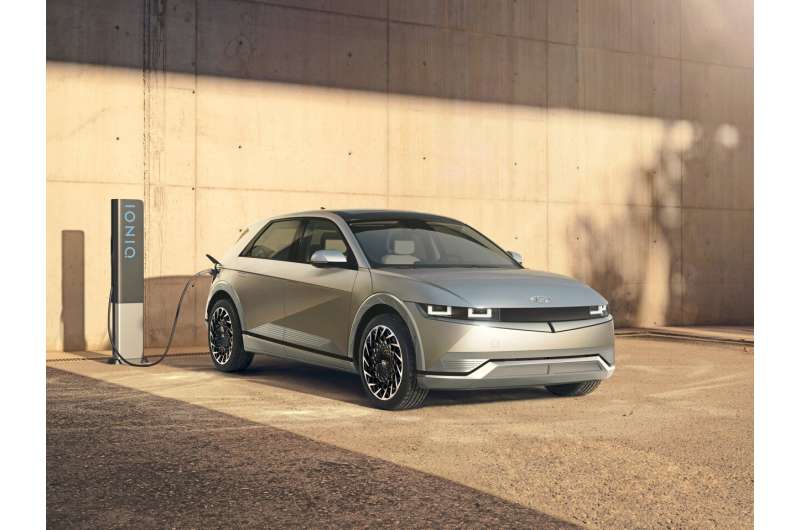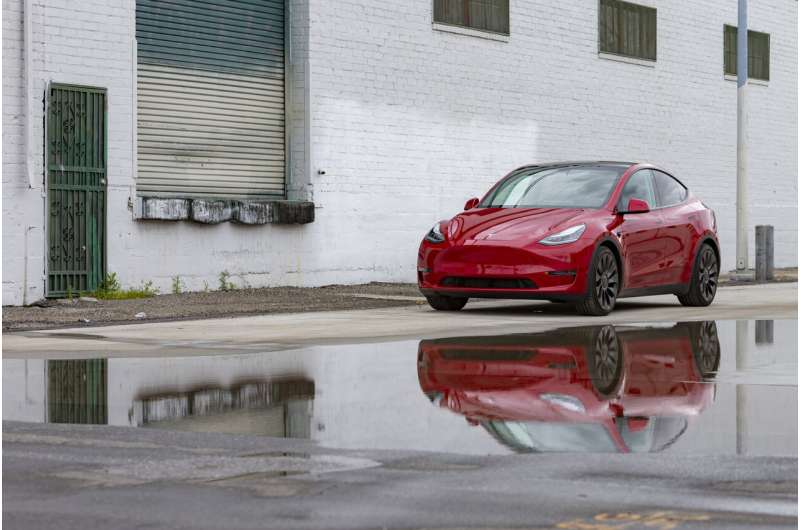Review: Hyundai Ioniq 5 vs. Tesla Model Y

Consumer appetites for small SUVs seem insatiable, and as electrification reaches every corner of the automotive landscape, a spotlight has appeared over compact EV SUVs. For two years, the Tesla Model Y has led this burgeoning niche with longer range estimates, cutting-edge driver aids and an established charging network. But other automakers are offering new alternatives, and the most promising may be from Hyundai.
Hyundai introduces the Ioniq 5, the latest member of the Ioniq family of vehicles, as its first electric vehicle designed from the ground up. It is positioned as an attainable, feature-rich and stylish crossover with strong range figures. Which EV is best? Edmunds' experts compared them to find out.
CHARGING AND RANGE
The Tesla Model Y is equipped with a 75-kWh battery and all-wheel drive for both Performance and Long Range trims. The 2022 Long Range variant is EPA-rated at 330 miles, though our range test of a 2021 model, with an EPA-estimated 326 miles, returned just 317 miles.
For quick charging on the go, Tesla's nationwide Supercharger network is unparalleled. A 30-minute visit can bump the Model Y's battery from 10% to 80% in ideal conditions.
Hyundai offers the Ioniq 5 in three trims with two battery packs. The rear-wheel-drive, 77-kWh model touts 303 miles of range, but a more comparable all-wheel-drive version is EPA-rated at 256 miles. Edmunds' range test revealed a more impressive 270-mile range.
Hyundai can't match Tesla's Supercharger network, so owners will need to rely on third parties for DC fast charging, such as Electrify America or ChargePoint. However, the Ioniq 5 is compatible with the latest 350-kW chargers that can ramp the Ioniq's battery from 10% to 80% in 18 minutes. Both SUVs have plenty of range for most buyers, but the Model Y's advantages in maximum range and charging availability give it the win.
Winner: Model Y
COMFORT AND STYLING
Tesla may push the envelope in battery and driving technology, but it's among the most conservative automakers when it comes to styling. The Model Y can easily be confused for the larger Model X or smaller Model 3, muddling its visual intrigue. Inside, the story is even more sober, with a single 15-inch screen and a steering wheel decorating the dash. The faux leather seats are comfortable during long-distance travel, though Tesla doesn't offer seat ventilation to cool you on hot days.
Hyundai counters with a distinctive 1980s hatchback retro vibe for its Ioniq 5. From its pixel design lights to its edgy panels, the Ioniq 5 begs for a second glance. Inside, there's an adjustable, open layout and an intuitive interplay of physical and touch-sensitive controls. Plush faux leather seats with heating and ventilation combine with a well-damped suspension for a comfortable ride. And unlike the noisy Model Y cabin, the Ioniq 5 is serene in motion.
Winner: Ioniq 5

SAFETY AND TECHNOLOGY
The Model Y's prominent infotainment screen boasts excellent resolution and immediate responsiveness. It can also run apps like Netflix, YouTube or games when parked. Alas, Tesla doesn't offer Apple CarPlay or Android Auto, so drivers can't fully integrate their smartphones to reduce distraction. And without a gauge cluster in the Model Y, drivers must take their eyes off the road to view speed and range. Tesla does offer a "Full Self-Driving" driver assistance mode for $12,000 more, but based on our testing, it isn't worth the added cost at this time.
Hyundai's cabin, with a reconfigurable digital gauge cluster and a 12.3-inch touchscreen, will feel more familiar to most shoppers. Apple CarPlay and Android Auto are included, and common settings like steering wheel adjustment are more easily accessible. Though not as comprehensive as Tesla's, Hyundai's driving aids work well and reduce fatigue on long trips.
What do you want more: Tesla's commitment to innovation or Hyundai's intuitive design? For us, it's a toss-up.
Winner: tie
VALUE AND WARRANTY
The 2022 Tesla Model Y Long Range is less expensive than the Performance variant at $60,190 including destination. Tesla exhausted its federal tax credits, so buyers must rely on state incentives for any on-paper savings. The warranty is average for the segment at four years/50,000 miles of basic and eight years/120,000 miles of battery coverage.
Hyundai's Ioniq 5 offers many more trim and powertrain configurations. An Ioniq 5 SEL with all-wheel drive, which is comparable to the Long Range, is priced at $50,645 before considering a $7,500 tax credit. Hyundai's warranty coverage trumps Tesla's too. You get five years/60,000 miles basic and 10 years/100,000 miles battery coverage.
Winner: Ioniq 5
EDMUNDS SAYS:
The 2022 Tesla Model Y holds an edge in range and charging network, but Hyundai's Ioniq 5 is a more polished product with style and substance. The winner here is the Ioniq 5.
© 2022 The Associated Press. All rights reserved. This material may not be published, broadcast, rewritten or redistributed without permission.





















